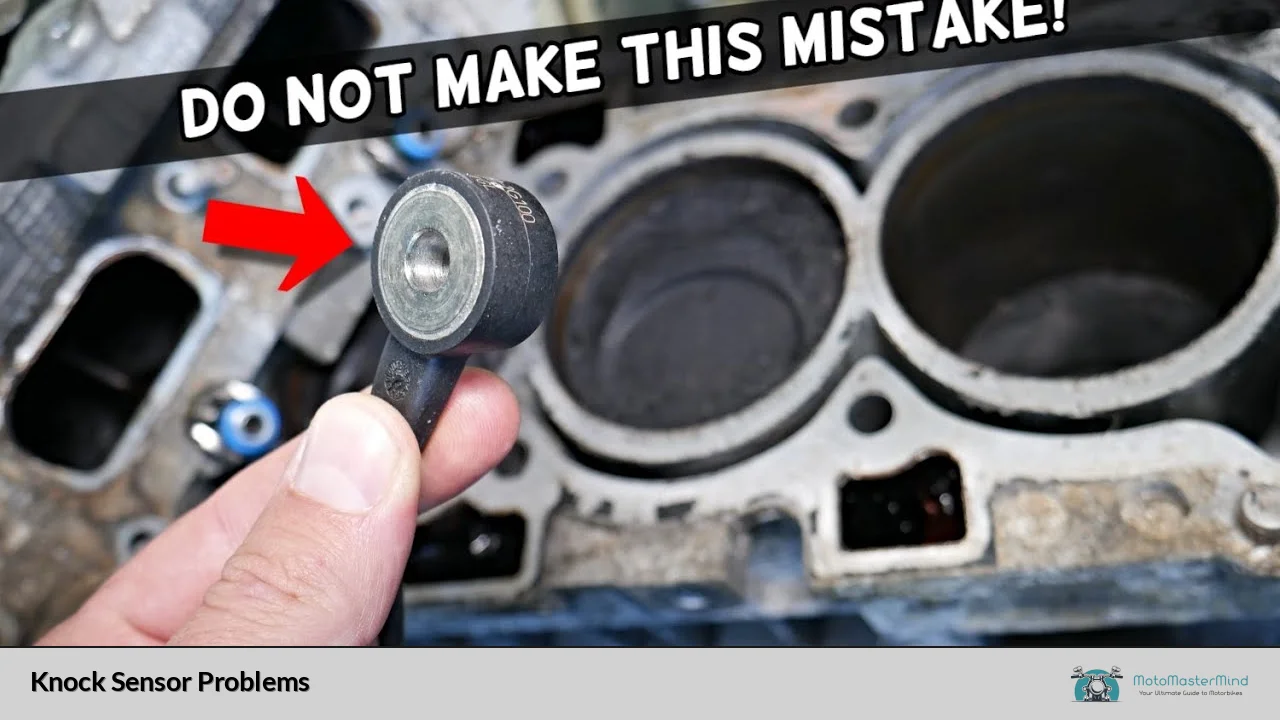Are you tired of that annoying knocking sound coming from your car’s engine? Well, you’re not alone. Many car owners face this issue, and it can be quite frustrating. Thankfully, there’s a solution – the knock sensor. In this article, we’ll delve into the details of knock sensor problems and how they can affect your vehicle’s performance.
What exactly is a knock sensor? Imagine having a tiny microphone inside your engine that listens for unusual sounds. That’s essentially what a knock sensor does. Its primary function is to detect abnormal vibrations or knocking noises in the engine. When it detects these sounds, it sends a signal to the engine control unit (ECU) to adjust the ignition timing and prevent potential damage.
However, like any other component in your vehicle, knock sensors can develop problems over time. One common issue is false knock sensor readings. This occurs when the sensor detects knocking sounds that aren’t actually present. False readings can lead to incorrect adjustments by the ECU, resulting in reduced engine performance and fuel efficiency.
Another problem is a faulty or malfunctioning knock sensor. This happens when the sensor fails to detect genuine knocking sounds. As a result, the ECU doesn’t make the necessary adjustments, leading to increased wear and tear on the engine. It can also cause engine overheating and decreased power output.
So, how can you identify knock sensor problems? The most obvious sign is that persistent knocking noise coming from your engine. Additionally, you may experience engine misfires, reduced acceleration, and even the illumination of the check engine light on your dashboard. If you notice any of these symptoms, it’s crucial to get your knock sensor checked by a qualified mechanic.

Knock sensor problems can significantly impact your vehicle’s performance and overall driving experience. Understanding the role of the knock sensor and recognizing the signs of problems can help you take timely action and prevent further damage to your engine. Remember, regular maintenance and inspections are key to keeping your car running smoothly.
Innovative Solutions Unveiled to Tackle Persistent Knock Sensor Problems in Automotive Industry
Are you tired of dealing with persistent knock sensor problems in the automotive industry? Well, you’re not alone. Many drivers and mechanics have been struggling to find effective solutions to this issue. But fear not, because innovative solutions are here to save the day!
One groundbreaking solution that has emerged is the advanced knock sensor technology. These modern sensors are designed to detect even the slightest vibrations or irregularities in engine combustion, providing real-time data to the vehicle’s computer system. By monitoring these signals, the knock sensor can identify potential problems before they lead to serious engine damage.
Another exciting development is the advent of intelligent engine control units (ECUs). These sophisticated systems utilize artificial intelligence algorithms to analyze the data received from the knock sensors. By constantly learning and adapting, these ECUs can optimize the engine’s performance and adjust parameters in real-time to prevent knock-related issues.
Additionally, automotive engineers have introduced novel materials for manufacturing knock sensors. These materials offer improved durability and sensitivity, ensuring accurate detection of engine knock. With enhanced reliability, these sensors can withstand harsh operating conditions, making them ideal for high-performance vehicles.
Moreover, automotive manufacturers have focused on improving the overall engine design to minimize knock-inducing factors. By refining the shape of combustion chambers, optimizing fuel injection systems, and employing advanced cooling techniques, engines can operate more efficiently, reducing the occurrence of knocking.

In the pursuit of innovation, researchers have also explored alternative fuel options. Some fuels, such as ethanol blends, have a higher resistance to knock compared to traditional gasoline. By using these alternative fuels, drivers can mitigate knock sensor problems while reducing their environmental impact.
To address persistent knock sensor issues, automotive technicians and enthusiasts can also benefit from comprehensive diagnostic tools. These cutting-edge devices enable in-depth analysis of engine performance, allowing for precise troubleshooting and identification of knock-related problems.
The automotive industry is witnessing an array of innovative solutions aimed at tackling persistent knock sensor problems. From advanced knock sensor technology and intelligent engine control units to improved materials and alternative fuels, these advancements are revolutionizing how we address engine knock. With these groundbreaking solutions, drivers can enjoy a smoother ride while ensuring the longevity of their vehicles. So, say goodbye to knock-related headaches and embrace the future of automotive engineering!
Rising Incidences of Knock Sensor Malfunctions Raise Concerns among Vehicle Owners
Are you worried about the increasing number of knock sensor malfunctions in your vehicle? You’re not alone. Many car owners are facing similar concerns, and it’s crucial to understand the implications of this issue. In this article, we’ll delve into the rising incidences of knock sensor malfunctions, their impact on vehicles, and what you can do to address and prevent such problems.
First, let’s grasp the significance of a knock sensor. Imagine you’re driving your vehicle uphill, pushing the engine to its limits. Suddenly, you hear a knocking sound coming from under the hood. That sound is an indication of abnormal combustion, commonly known as “knocking.” The knock sensor plays a vital role in detecting these unusual vibrations or sounds in the engine. Once detected, the sensor sends signals to the vehicle’s engine control unit (ECU), which adjusts the ignition timing to prevent engine damage.
Unfortunately, knock sensor malfunctions have become increasingly prevalent. This issue can be attributed to various factors, including age-related wear and tear, exposure to extreme temperatures, poor fuel quality, or even manufacturing defects. When a knock sensor fails to detect or inaccurately detects knocking, it can lead to severe consequences for your vehicle’s engine, such as reduced performance, decreased fuel efficiency, and potential long-term damage.
Addressing knock sensor malfunctions promptly is crucial to maintain the health of your vehicle. If you suspect a problem with your knock sensor, it’s advisable to consult a qualified mechanic who can diagnose the issue accurately using specialized diagnostic tools. Replacing a faulty knock sensor is typically the recommended course of action, ensuring your vehicle’s engine operates optimally and avoids significant damage in the long run.

To prevent knock sensor malfunctions, regular vehicle maintenance is key. Be diligent in following the manufacturer’s recommended maintenance schedule. Additionally, use high-quality fuel from reputable sources to minimize the risk of poor combustion and subsequent knocking.
The rising incidences of knock sensor malfunctions are a cause for concern among vehicle owners. Understanding the role of the knock sensor, recognizing the signs of malfunction, and taking proactive measures through regular maintenance and quality fuel usage can help mitigate potential issues. By staying vigilant and addressing any problems promptly, you can ensure the smooth operation and longevity of your vehicle’s engine.
Researchers Discover Surprising Link between Knock Sensor Issues and Fuel Efficiency
Are you looking to optimize your vehicle’s fuel efficiency? Well, here’s a surprising discovery that researchers have made – the fascinating connection between knock sensor issues and fuel efficiency. Yes, you heard it right! Let’s delve into this intriguing finding and explore how it could impact your vehicle’s performance.
First things first, what exactly is a knock sensor? In simple terms, it’s like an attentive guardian for your engine. Its primary function is to detect unusual vibrations or knocking sounds within the engine. These vibrations, commonly caused by improper combustion, can lead to engine damage if left unaddressed. This is where the knock sensor steps in, as it alerts the engine control unit (ECU) to adjust the fuel-to-air ratio and prevent potential harm.
Now, let’s connect the dots. How does a faulty knock sensor affect fuel efficiency? Picture this: your knock sensor fails to identify these abnormal vibrations, causing the ECU to remain ignorant of the brewing trouble within the engine. As a result, the fuel-to-air mixture may not be precisely adjusted, leading to suboptimal combustion and lower fuel efficiency.
To put it simply, when the knock sensor malfunctions, your car’s engine becomes less efficient in burning fuel. This inefficiency forces the engine to burn more fuel than necessary, therefore reducing your vehicle’s overall mileage. It’s like trying to light a fire with damp wood; you’ll need more fuel to generate the desired amount of heat.
So, what can you do about it? Firstly, it’s crucial to stay alert to any signs of a faulty knock sensor. If you notice irregular engine noises, decreased power, or increased fuel consumption, it might be time to have your knock sensor checked. Regular maintenance and diagnostic checks can help identify and address such issues before they worsen.
The recently discovered link between knock sensor issues and fuel efficiency sheds light on a seemingly unrelated yet impactful aspect of vehicle performance. By understanding this connection, you can take proactive measures to maintain your vehicle’s optimal fuel efficiency and keep your engine running smoothly. Remember, a well-functioning knock sensor is like having an attentive guardian for your engine, ensuring it performs at its best while maximizing fuel economy.
Remember, maintenance and vigilance are the keys to keeping your vehicle in top shape. Stay informed, stay proactive, and enjoy the benefits of improved fuel efficiency!
Experts Warn of Potential Engine Damage as Knock Sensor Problems Go Unaddressed
Introduction: When it comes to your vehicle’s engine, there’s one crucial component that often goes unnoticed but plays a vital role in its overall health and performance – the knock sensor. Despite its small size, the knock sensor is responsible for detecting abnormal vibrations or knocking sounds within the engine. However, experts are now warning car owners that neglecting knock sensor problems can lead to severe engine damage. In this article, we’ll delve into why the knock sensor is crucial, the potential consequences of ignoring its issues, and how you can protect your engine from harm.
Detecting Trouble: How Knock Sensors Work: Imagine the knock sensor as your car’s internal listening device. It monitors the engine’s combustion process, picking up on any unusual vibrations or knocking noises. Acting as a guardian, the knock sensor sends signals to the engine control unit (ECU), which adjusts the ignition timing accordingly to prevent damage. This timely adjustment helps maintain engine efficiency, power, and longevity.
The Dangers of Ignoring Knock Sensor Problems: Now, picture a scenario where the knock sensor malfunctions or goes unaddressed. Without an effective knock sensor, the engine may fail to detect potentially harmful knocking sounds. This can lead to a domino effect of problems, such as incorrect spark timing, increased stress on engine components, reduced fuel efficiency, and compromised power output. Over time, the cumulative effects of unchecked knock sensor problems can result in severe engine damage, leading to costly repairs or even engine failure.
Protecting Your Engine: Prevention is key when it comes to safeguarding your engine against knock sensor issues. Regular maintenance and scheduled inspections by qualified mechanics are essential. If you notice any signs of engine knocking, unusual vibrations, or a decline in performance, don’t ignore them. Address the issue promptly to prevent further damage.
Additionally, remember that using high-quality fuel and following the manufacturer’s recommended octane rating for your vehicle can contribute to knock sensor health. Poor fuel quality or using the wrong octane level can increase the chances of knocking, placing additional strain on the knock sensor and other engine components.
Experts emphasize the critical role of the knock sensor in preserving your engine’s health. By promptly addressing any knock sensor problems and ensuring regular maintenance, you can avoid potential engine damage and enjoy a smoother, more reliable driving experience.
Remember, listening to your engine’s warning signs can save you from costly repairs down the road. Take care of your knock sensor, and your engine will thank you with years of trouble-free performance!

